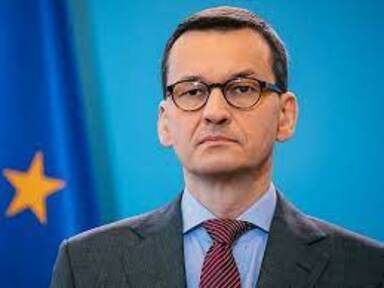On Poland and Germany – an interview with the Polish Prime Minister in Der Spiegel (by Jan Puhl):
‘DER SPIEGEL: The swap deal that has been agreed to – according to which Poland will supply Ukraine with weapons that Germany then replaces from Bundeswehr stocks – still isn't working.
Morawiecki: What counts is not what is written on paper, but what is actually implemented. Poland has supplied weapons worth well over $2 billion already, 300 tanks and other heavy equipment. Berlin's hesitation, its inaction, seriously calls into question the value of the alliance with Germany. And we are not the only ones saying that. I am hearing this from quite a few other heads of government in Europe, as well.’
(…)
‘DER SPIEGEL: How will the Ukraine crisis affect Germany's role in Europe? Morawiecki: It is becoming clear that German energy policy is in ruins. The phaseout of coal and nuclear power was premature, and we don't even need to talk about the construction of Nord Stream 1 and 2 and the associated dependence on Russia. Germany's policies have inflicted tremendous damage on Europe.’
(…)
‘DER SPIEGEL: Your government wants Germany to pay 1.3 trillion euros in reparations for the destruction caused during World War II. Do you think you will ever get the money? Morawiecki: The equivalent of 6.2 trillion zloty, that is not such a fantastic sum. The budget of the entire Federal Republic of Germany, meaning the budget of the federal government together with that of the states, is almost as large. Poland is the country upon which the most destruction was visited in World War II, but we were never compensated for it. We will first address the Berlin government with a diplomatic note. We also consider the Germans' legal analyses, according to which Poland waived reparations in an agreement with the GDR in 1953, to be wrong. The Soviet Union forced Poland to do so at the time. The Poles could hardly demand reparations from a socialist "brother nation." Moscow coerced its proxy in Warsaw, Bolesław Bierut, to agree, and the issue wasn't even brought before the Polish parliament. No ratification documents were submitted to the United Nations. We do not recognize the agreement. We want to hold talks in Berlin and also invite representatives of Israel, since half of the Polish victims were citizens of Jewish heritage. It is possible that we will also take our claims to international courts at a later stage. We will go all around the world to present the report, which takes into account not only human and material losses, but also that of cultural assets.’
(…)
‘DER SPIEGEL: What does rule of law have to do with the war?
Morawiecki: I think the accusations against us are absurd. After reunification, the Germans vetted the entire judiciary and prosecutors of the GDR, and only 30 percent were allowed to continue working. In our country, the communist judges remained in office.
DER SPIEGEL: But that was 30 years ago.
Morawiecki: It has, however, left traces in the thinking of today's judges and certain practices, so we wanted to reform our judiciary. I see more of a problem with the rule of law in the European institutions, because they presume to have the right to judge Poland's judicial reform, but they do not have that right under the EU Treaty.’
(…)
‘DER SPIEGEL: Your old partner, Hungarian Prime Minister Viktor Orbán, is trying to avoid taking a tough stance toward Moscow. Do you still have understanding for him?
Morawiecki: The other day, I read results from a polling institute. They show that the vast majority of Hungarians feel the same way about the war as Orbán does, whether I like it or not.
DER SPIEGEL: Because Orbán's party controls the majority of the media in Hungary.
Morawiecki: But also no more so than the political mainstream in Western Europe controls the media there. It is difficult to have a dissenting opinion. So far, Hungary has always agreed to the sanctions. As such, I still see a foundation for cooperation.’
(…)
‘DER SPIEGEL: But Poland could agree to a defense union? Morawiecki: We have been calling for steps in this direction for years. The Ukraine crisis has shown that the strongest guarantor of security is the U.S. If Ukraine were dependent on Germany within the framework of a European defense policy, it would no longer exist today.’
Read the interview here.
It’s almost as if Poland is in war with Germany.
The lack of diplomatic niceties, the absolute hostility, the demands, the slight paranoia, it proves that the war made us forget up some of the illiberal positions of the current Polish government, and the nastiness that goes hand in hand with these positions.
The suggestion that ‘political mainstream’ controls the media in Western Europe makes Mr. Morawiecki look like an avid reader of Chomsky. Maybe he is.
It’s understandable that Scholz recently proposed a majority vote for the EU, interestingly enough Morawiecki didn’t comment on that, but he was already angry enough.
